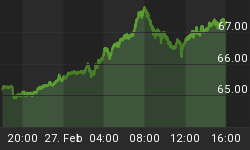What do the US, Australian and British housing booms have in common? Each boom was triggered by their respective central banks, though one would never guess this from what passes as economic commentary these days. Geoff Elliott reported that "Americans have used their houses as an alternative bank, effectively extending their mortgage to take advantage of the ever-increasing value of their homes". (The Australian, US housing bust contagion could spread, 14 September 2006). Elliot is simply parroting the consumption-drives-the-economy fallacy. He then takes this fallacy to the logical conclusion that a housing bust would hit Chinese exports to the US which in turn would have the effectof cutting Chinese demand for Australian raw materials.
This is the kind of nonsense I have come to expect from journalists. (The Bush-hating Elliott is the same bloke who nonsensically wrote that "Roosevelt's New Deal...helped lift the US out of depression in the 1930s. [The Australian, Rising petrol prices fuel anti-Bush backlash, 11 July 2005]). It is painfully obvious that Elliott is completely ignorant on matters pertaining to economicsand economic history.
But what of those who should know better? Irwin M. Stelzer declared that a contracting housing market would hit "consumer spending" which "may explain the recent drop in consumer sentiment" (NRO, Home Safe? The slowing housing market makes its mark on the rest of the economy, 22 August 2006). He, like Elliott and so many others in the media, concludethat a fall in housing values will hit consumption and hence growth.
Although there seems to be little doubt that the US housing market is cooling (the same seems to be the case in Australian and the UK) the causes and consequences of such a slowdown appear to be completely lost on the economic commentariat -- and not just in the US and Australia. Naturally observers are stressing the fact that since June 2003 the Federal Reserve has moved rates up from 1 per centto 5.25 per cent today.
From this they deduce that rising rates are the problem. They're not. The problem is the Fed's roller-coaster monetary policy. Since January 2001 money supply has increased by about 28 per cent. (This is an approximate number using the Austrian definition of money supply*). In my opinion this monetary expansion fuelled the housing boom and the US demand for imports. In doing so it had the effect of distorting the pattern of production in Chinaand other countries that are heavily dependent on exports to the US.
A quick look at current monetary figures reveal that from April 2005 to this month credit has actually contracted. The total of demand deposits, deposits at commercial banks and thrift institutes have fallen by about 3 per cent. The point that our commentators should grasp, but rarely if ever do, is that once a country sets upon credit expansion it must continue to increase saidcredit if it wants to avert a recession.
(In 2001 the Australian economy was clearly heading into recession. In response to this the Reserve Bank of Australian expanded M1 by 22 per cent in one year. Recession signs have re-emerged and the Government is at a loss as to whatto do about it).
One of the consequences of excess credit is that people tend to accumulate debt. Richard von Strigl, an eminent pre-WWII Austrian economist (he died in 1942) observed that when "....expansion progresses, the greater will become the share of additional credits in the overall volume of credits within the economy". (Capital and Production, Mises Institute,2000, first published 1934).
Heavy mortgages are just one of the ways excess debt is acquired. The inflated prices of houses also tends to encourage people to borrowing against the value of their properties. Commentators then call this process the "wealth effect". But it ought to be perfectly clear that this is a monetary fiction. Artificially low interest rates drive up the money value of property which then encourages the owners to borrow more from the banks which will be doing everything in their power to rid themselves of their excess deposits. Sooner or later the monetary brakes must be applied -- which is what the Fedhas been slowly doing.
What are the political consequences for the Bush administration? Fortunately for President Bush oil prices have started to slide. This will probably ease the economic and electoral pain of a slowing economy before the November elections. Moreover, I have no doubt that if the Fed believes the US economy is sliding into recession it will once again slash rates -- hence the monetary roller-coaster. If providence favours the Republicans the economy should be bubbling alongby the time the 2008 election arrives. If not....
* The Austrian school of economics definition of the money supply:
Currency outside U.S. Treasury, Federal Reserve Banks and the vaults of depositoryinstitutions.
Demand deposits at commercial banks and foreign-related institutions other than those due to depository institutions, the U.S. government and foreign banks and official institutions, less cash items in the process of collectionand Federal Reserve float.
NOW (negotiable order of withdrawal) and ATS (automatic transfer service) balances at commercial banks, U.S. branches and agencies of foreign banks, and Edge Act corporations. NOW balances at thrifts, credit union share draftbalances, and demand deposits at thrifts.
AMS definition therefore equals cash plus demand deposits with commercial banks and thrift institutions plus saving deposits plus government depositswith banks and the central bank.
M1 is clearly close to the Austrian definition even though it includes travellers cheques.















